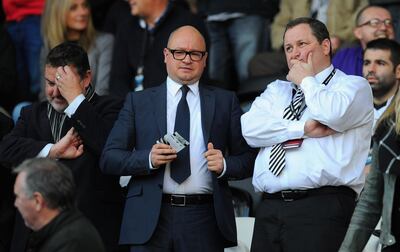Debenhams , the 241-year-old UK department-store chain that anchors many of the country’s high streets, was taken over by lenders after rebuffing a last-minute offer from billionaire Mike Ashley.
The retailer entered a form of UK insolvency proceedings that allowed US hedge funds and other lenders to take control. Stores employing about 26,000 people will continue to operate as normal, but shareholders’ stakes are now worthless.
The so-called prepackaged administration culminates a months-long battle between Ashley, whose Sports Direct International owned about 30 per cent of Debenhams, and lenders seeking to protect their investments via a £720 million (Dh 3.45 trillion) debt restructuring. The two sides failed to come to an accord even after Ashley improved a last-ditch proposal to salvage his stake.
Administrator FTI Consulting will seek a sale of the company immediately, which could give Mr Ashley a new opportunity to bid. Proceeds will be used to fully repay debt and it’s unlikely there will be any cash left over to go to shareholders, Debenhams said on Tuesday.
“It is disappointing to reach a conclusion that will result in no value for our equity holders,” Debenhams chairman Terry Duddy said. “However, this transaction will allow Debenhams to continue trading as normal, access the funding we need, and proceed with executing our turnaround plans.”
Debenhams was already planning to close 50 of its 241 stores and seek rent reductions to tackle the effects of a wider crisis in UK retail that’s claimed household names from department-store owner BHS to the British arm of Toys “R” Us. The department-store operator has struggled to develop its online business as consumers shift purchases to Amazon.com and other e-commerce providers, with Brexit-related jitters hitting spending.
Debenhams’ secured lenders have been in the driving seat in negotiations since extending a lifeline in February. The company gave Ashley an ultimatum last month to commit to a restructuring on creditors’ terms or risk completely losing his investment. The lenders withheld £99m of funding until they gained control.
The creditor group has included Barclays and Bank of Ireland, along with hedge funds Alcentra and Silver Point Capital.
The company rejected Mr Ashley’s offer to underwrite £200m of new funding even after the billionaire boosted the proposal by £50m and asked lenders to write off a smaller amount of debt, according to Bloomberg.
Debenhams previously rebuffed other Mr Ashley proposals, including offers to extend loans, to buy the company’s Danish stores and to underwrite a shareholder rights issue. He had also floated the idea of a possible purchase of Debenhams’s equity.
“While Sports Direct has made a number of highly conditional proposals, each of which was fully considered by the Plc board, none were deemed deliverable given conditionality, timing and other stakeholder obligations and considerations,” Debenhams said on Tuesday
Mr Ashley led an ousting of Debenhams’s chairman and CEO from the board earlier this year and last month called for a special shareholder meeting to remove other directors. Debenhams said on Tuesday that meeting will not go ahead.
Talks became heated in recent weeks, with Mr Ashley calling for the board to take lie-detector tests and for the company’s advisers to be “put in prison”. The retail magnate also vowed to expose what he said was an insider plot to steer the company into the hands of hedge funds.
A person familiar with the situation has told Reuters that there has been a total breakdown of trust with Mr Ashley, and that Debenhams feared that if he became CEO he would renege on his financial promise and put the company into administration himself, allowing him to select only the stores he wanted to own.
Mr Ashley had spent months battling to wrest control of the business, offering a rescue plan that came with the condition he was appointed the chief executive. With tensions increasing between the two sides, Mr Ashley even demanded that Debenhams board members take lie detector tests.
A prepackaged administration doesn’t require shareholder approval and allows a company to keep operating without risk to jobs or pension holders. It was used by lenders to UK government contractor Interserve last month after US hedge fund Coltrane Asset Management, a major shareholder, resisted a debt plan.
The game isn’t necessarily over for Mr Ashley, who bought rival store chain House of Fraser out of administration last year also owns Newcastle United football club. The sale process to repay Debenhams’s debt may still allow him to gain control.
“It is likely that Mike Ashley’s pursuit of a controlling stake in the business is far from over,” said Simon Underwood, business recovery partner at accountancy firm Menzies.
“Now Debenhams is in administration, we will have to wait and see who the bidders turn out to be.”


